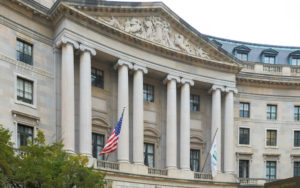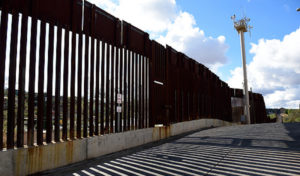
FDA grants emergency use authorization for new COVID-19 test, EPA proposes to retain existing emission standards for fine particulate matter, and more…
IN THE NEWS
- The U.S. Food and Drug Administration granted emergency use authorization for the first saliva-based coronavirus test, which was developed by Rutgers’s RUCDR Infinite Biologics and its collaborators. Unlike current tests that require a nasal or throat swab, this test can be self-administered by a patient. Andrew Brooks, chief operating officer and director of technology development at RUCDR, called the approval “significant” because health care professionals will no longer be exposed to coronavirus or need protective equipment when testing patients, therefore preserving protective equipment for patient care needs. RUCDR expects the new test to increase coronavirus testing to “tens of thousands of samples daily.” The test, however, must still be performed in a health care setting under the supervision of a trained provider.
- The U.S. Environmental Protection Agency (EPA) proposed to keep existing emission standards unchanged for a type of industrial particle that has been linked to higher mortality rates among COVID-19 patients. According to a national study by researchers at the Harvard T.H. Chan School of Public Health, a small increase in fine particulate matter, was associated with an increase of up to 15 percent in the COVID-19 mortality rate. In the proposal to retain existing regulations, EPA Administrator Andrew Wheeler reportedly said that “the current standard is protective of public health” and “does not need to be changed.” Ken Cook, president of the Environmental Working Group, decried the decision, saying that “if there ever was a moment for all Americans, regardless of political persuasion, to demand the Trump EPA stop gutting the nation’s air quality standards and finally place a premium on public health, it’s now.”
- In its first online session, the Kansas Supreme Court ruled that the Legislative Coordinating Council lacked authority to revoke Governor Laura Kelly’s executive order banning gatherings larger than 10 people. The decision, made in anticipation of Easter celebrations, permitted the ban on large religious gatherings to remain in effect, but avoided evaluating the constitutionality of the executive order. The holding ends one source of conflict between the Democratic governor and Republican-controlled state legislature on the COVID-19 response. Governor Kelly stated that the executive order to limit religious gatherings “was a difficult decision, and not one I was hoping to have to make.”
- President Donald J. Trump recently threatened to withhold visas from any country that does not repatriate its citizens from the United States during the coronavirus pandemic. In a memo released last Friday, President Trump directed acting U.S. Secretary of Homeland Security Chad Wolf to promptly notify U.S. Secretary of State Mike Pompeo of any foreign countries refusing to comply with deportations, at which point the U.S. Department of State would have seven days to implement visa sanctions. Less than a week before President Trump released the memo, government officials in Guatemala reportedly requested that the United States limit deportations following reports of multiple Guatemalan deportees testing positive for coronavirus.
- The U.S. Environmental Protection Agency (EPA) proposed a rule that would streamline existing gasoline and diesel fuel administrative compliance requirements to promote cost savings. The proposed rule would cut administrative costs by deleting expired or redundant compliance provisions, which would save an estimated $32.9 million annually. EPA expects the new regulations to go into effect on January 1, 2021. In a press release, EPA stated that fuel standards will “remain just as stringent” and current statutory requirements for fuels under the Clean Air Act will remain the same.
- Governors from Pennsylvania, New York, New Jersey, Connecticut, Delaware, Rhode Island, and Massachusetts created a multi-state council to develop a framework to lift stay-at-home orders gradually and restore the economy after the COVID-19 pandemic. Governors from California, Oregon, and Washington announced a similar agreement, spurring a debate over who has the authority to reopen state economies. In a press briefing, President Trump originally stated that he had “total” authority to require governors to open their states’ economies. In response to stark criticism, the President revised his claim twice, stating first that he would authorize “each individual governor…to implement a reopening” plan as the governor deems appropriate for his state and later reportedly stating that governors will “call the shots.”
- A coalition of 25 state attorneys general sent a letter to U.S. Department of Treasury Secretary Steven Mnuchin requesting the Treasury Department “take immediate action to ensure that emergency monetary relief authorized by the Coronavirus Aid, Relief, and Economic Security Act (CARES Act) will not be subject to garnishment by creditors or debt collectors.” The Act committed over $2 trillion to providing “fast and direct economic assistance,” including stimulus payments to individuals with incomes below $75,000. The Act, however, omits any prohibition on seizure of a stimulus payment by debt collectors or creditors. The state attorneys general fear that “what appears to be a legislative oversight” could ultimately “undermine the purpose of the CARES Act.”
- The city of Oakland, California reserved 74 miles of its public roads for pedestrians and cyclists, restricting motor vehicle traffic to emergency vehicles and immediate residents only. Under the new Oakland Slow Streets program, nearly 10% of Oakland streets have been closed to through traffic to create more space for residents to engage in physical activity while complying with social distancing requirements during the current public health crisis. Oakland Mayor Libby Schaaf lauded the program as an opportunity for residents to “get outside and walk, bicycle, or run through their neighborhoods and get around in a safer way.”
- The U.S. Department of Education negotiated a settlement agreement to process roughly 170,000 student loan forgiveness claims within the next 18 months to aid borrowers defrauded by their colleges. In the 2019 class action complaint, students claimed that since June 2018, the agency has “arbitrarily and capriciously stonewalled the relief process with its ‘blanket refusal’ to process their borrower claims.” After students waited up to four years for a decision from the department, lead plaintiff Theresa Sweet remarked on the “enormous relief to know that students will finally have answers on their borrower defense.”
WHAT WE’RE READING THIS WEEK
- In an article for The Journal of Corporation Law, Professors Kenneth Ayotte of the University of California, Berkeley, School of Law and David Skeel, of the University of Pennsylvania Law School compared the merits of government bailouts— strategy the Obama Administration used in 2008 to deploy taxpayer funds to rescue financial institutions—with the more ad hoc approach of allowing institutions such as Lehman Brothers to file for bankruptcy. Despite the “conventional wisdom” that the bankruptcy filing of Lehman Brothers was the inciting event of the 2008 global financial crisis, Ayotte and Skeel argued that allowing the ordinary bankruptcy process to take its course is still preferable to a discretionary government bailout system.
- In a report for the Brookings Institution, Molly Kinder, of the Metropolitan Policy Program advocated an “urgent policy change” to provide essential workers with federally mandated hazard pay. Kinder reported that many essential workers, such as grocery store clerks, make under $15 per hour—less than a living wage—and are dying at higher rates because of their greater exposure to the coronavirus. Kinder discussed the advantages and disadvantages of current proposals for hazard pay, such as the “Heroes Fund.” Kinder concluded that whatever proposal legislators adopt, they should ensure that essential workers receive a living wage and are paid on a progressive scale that fairly accounts for current wages. Kinder called it an “outrage that so many workers are risking their lives while being denied the dignity of a family-sustaining wage.”
- In a report for the Urban Institute, Sarah Benatar, proposed changes to Medicaid coverage of birthing centers and home birth deliveries due to the growing demand for out-of-hospital births amid the coronavirus pandemic. Benatar called on state Medicaid programs to improve reimbursement rates for midwifery care and birth center facility payments, expand Medicaid-managed care plans to include freestanding birth centers within their networks, and immediately expand benefits to include coverage to midwives who attend home births, particularly in states that do not cover home births. Benatar argues that Medicaid support will mitigate the often prohibitive costs for out-of-hospital birth alternatives, which will help keep pregnant people and newborns safe while relieving strain on the burdened health care system.
FLASHBACK FRIDAY
- In a 2018 essay for The Regulatory Review, Nicholas Bellos presented an argument for financial regulators and the U.S. Congress to be decisive and flexible in their response to the next financial crisis. In his essay, Bellos discusses a paper by Roberta Romano, a professor at Yale Law School, in which Romano argued that because regulation is made quickly and with imperfect information during a crisis, regulators should include “sunset provisions” that require review of regulatory schemes once more information becomes available. Romano also proposed that regulation during financial crises should embrace experimentation because this approach allows for increased oversight and greater flexibility in finding solutions.



